How To Create an Online Course With ChatGPT
 Platform Review
Platform Review
Learn how to create an online course with ChatGPT, a powerful language model that can help you with everything from brainstorming ideas to generating content.
So, you want to create an online course all by yourself?
That’s a great idea, but between coming up with an engaging topic, creating an outline, creating video scripts, and writing content, it can feel completely overwhelming.
The good news is, you don't have to do it alone. ChatGPT, an AI model developed by OpenAI, can help you optimize parts of your course creation process.
Now, let's be clear from the outset - ChatGPT, as remarkable as it is, can't magically create the entire course for you.
It's not a "set it and forget it" kind of thing.
However, it can be a fantastic helper. Think of it as your AI-powered virtual writing assistant.
And, while ChatGPT can't build your entire course for you, it can suggest content ideas, rewrite topics more simply, come up with catchy headings, and more.
ChatGPT can help you cut down significantly on your course creation time.
But to use it efficiently, you need to be good at prompting, which is why I am going to provide you with an alternative that will make it easy for you to make the most out of chatGPT, even if you are not a pro in prompting.
So, in this guide, I'll show you exactly how to use ChatGPT to create an online course to make your creation process faster, easier, and better than ever.
So, how do you create an online course with ChatGPT?
Here is how ChatGPT can help you create an online course:
1. generate course titles and sub-titles
2. suggest course outline
3. suggest new content to be added to the course
4. generate video scripts for your course
5. re-write and simplify course content
6. do keyword research for your course content
7. incorporate keywords seamlessly into your course content
8. create engaging quizzes for your course
9. create engaging assignments for your course
10. help you answer your students' questions
11. help create compelling marketing copy including email copy
12. help with the translation of your course content
13. help you proofread, check grammatical consistency
How not to use ChatGPT
Before asking ChatGPT for help with your online course, you need first to have a conversation with it about your course goals, audience, knowledge level, and teaching style.
Once ChatGPT confirms it understands the topic of your course and what you are trying to do, only then tell it what kind of task you need it to do.
Then the output of ChaTGPT will be much more helpful. Otherwise, the AI won't have enough context about you as a course author and your courses, so it will only be able to come up with very generic stuff.
But if you do this initial step of giving more context to the AI, the output will be much more helpful.
So without further ado, let's dive right in.
You can also check out all the free guides available at the Course Creators Academy.
Generate Course Titles and Subtitles Using ChatGPT
Now that you already had a conversation about your course with ChatGPT, you can go ahead and prompt it.
Remember, the conversation about course goals, audience, and student knowledge level is important else, the answer ChatGPT produces will be too vague and sometimes even irrelevant for your course.
So, let's say you're creating an online course on personal finance. You want a compelling title that immediately grabs your potential students' attention.
You can ask ChatGPT with prompts like:
"I need an attention-grabbing title and sub-title for my personal finance course. Could you provide some suggestions?"
ChatGPT might come up with several suggestions as shown in the image above.
You can also create a catchy meta description for your course. These brief descriptions, seen in search results and on your course page, need to spark interest and drive clicks.
So, keep them short (150-160 characters, 2 sentences), highlighting benefits, features, and keywords.
You may use this prompt example to generate the meta description for your course:
"Could you create a succinct meta description for my personal finance course, emphasizing its valuable topics, benefits, and the importance of 'money-saving tips' to capture the interest of prospective students? Aim for 150 to 160 characters, not more"
Pick the best description for your financial goals and course focus. Mix or adjust details from the examples to create a personalized course description. Remember, the personal finance example is just a starting point; tailor it to your topic.
And, as I mentioned earlier, for ChatGPT to generate better results, it needs to know as much as possible about your course, which means you will need to give a lot of context to ChatGPT.
How to make the most out of ChatGPT without being an ace at prompting?
Alternatively, consider using an online course hosting platform like OnlineCourseHost.com, which comes integrated with ChatGPT.
This platform automatically provides the AI with comprehensive context about your website and courses, including sections, lessons, and other details.
As a result, the AI has a thorough understanding of your course content, allowing it to swiftly and accurately generate engaging titles and subtitles with minimal input from you.
This integration simplifies your workflow, as the initial results will be highly relevant without the need for extensive prompting.
However, you can still refine the outcomes and ask follow-up questions, just as you would in a typical GPT chat session.
Here is an example from OnlineCourseHost.com:
Suggest Course Outlines
Now that your topic and audience are defined, it's time to outline your course content. This will serve as your roadmap to keep you on track as you build your course.
For the sake of this post, let's continue with the example of the personal finance course to show how ChatGPT can guide you in crafting a well-structured course outline.
First, decide what your course is about—investment strategies, financial planning, or both. Also, understand your audience and the finance topics you want to cover, because this will help customize your outline.
Once you're clear, use a prompt like:
"Can you outline a course structure for 'Financial Fusion: Uniting Wealth and Wisdom'? The main topics are investment strategies, financial planning, and wealth management."

Once ChatGPT provides an initial outline, review and revise it as needed.
Next, you can ask ChatGPT to help you arrange the lessons so they make sense and help your students learn about money and wealth together with this prompt:
"Can you help me arrange the lessons so they make sense and help my students learn about money and wealth together?"
Suggest New Course Content
Using ChatGPT to suggest new content can save you time and effort in brainstorming ideas on your own. It can suggest additional topics or subtopics to enhance your course.
It can also provide different perspectives and angles you may not have thought of, ensuring a well-rounded and comprehensive course experience for your students.
Here is an example of a prompt you can use :
"Provide me ideas for more content in the 'Financial Fusion: Uniting Wealth and Wisdom' course. Think of topics or activities that would make the course more engaging and informative."
Generate Video Scripts For Your Course
Next, ask ChatGPT to draft scripts for your video or audio lessons.
Give it the lesson titles and outlines, your target audience details, and the key points you want to convey.
ChatGPT will generate a script in a friendly teaching tone with clear explanations and examples. It may even suggest visuals or graphics to include!
For instance, you could prompt ChatGPT with this:
"Help me create a script for a video lesson on 'Savings and Retirement Planning' for my course, using a narrative structure."
ChatGPT will expand your points into a comprehensive script, making sure it flows logically.

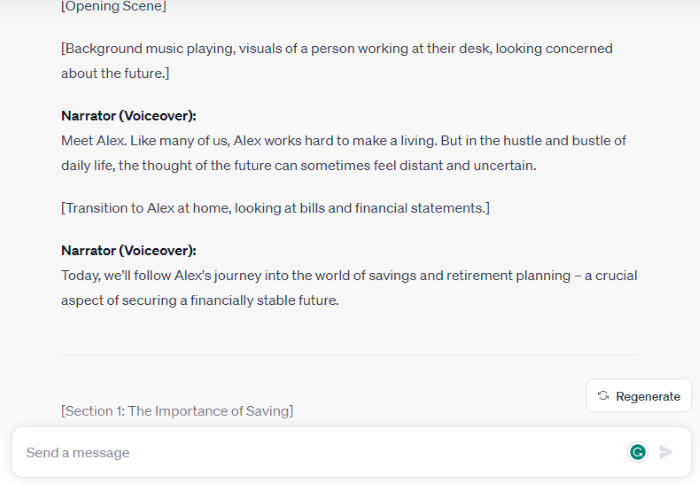
Make sure to review the script before recording your lesson.
By using ChatGPT's assistance with this prompt, you can streamline the script creation process for your video lessons and ensure that they are informative, engaging, and well-structured.
Rewrite and Simplify Complex Concepts
While creating an online course with ChatGPT, you might encounter complex ideas within your content that require simplification for better understanding.
ChatGPT's capability to break down complex concepts applies seamlessly, even when focusing on personal finance within your "Financial Fusion: Uniting Wealth and Wisdom" course.
Suppose your course covers a complex financial concept, like the Efficient Market Hypothesis, which you know is a challenging topic, and you'd like to break it down for your students to understand better.
You can prompt ChatGPT with a question like:
"I'm teaching a personal finance course, "Financial Fusion: Uniting Wealth and Wisdom." How can I simplify the Efficient Market Hypothesis for my students, many of whom might be new to finance?"
You can find ChatGPT's response in the image below:


With this ChatGPT response, you can see how complex financial concepts like the Efficient Market Hypothesis can be simplified.
This way, your students, even those new to finance, can grasp the idea easily and become more financially literate.
In the following sections, I'll explore how ChatGPT can optimize your course and make the entire experience more engaging.
Do Keyword Research for Your Course
One of the most important aspects when learning how to create an online course with ChatGPT is to produce high-quality course content for your course, and make sure people find it.
Start by leveraging ChatGPT to research relevant keywords. For example, in the finance course, you can prompt ChatGPT with this question:
"Can you suggest keywords related to personal finance for my "Financial Fusion: Uniting Wealth and Wisdom."
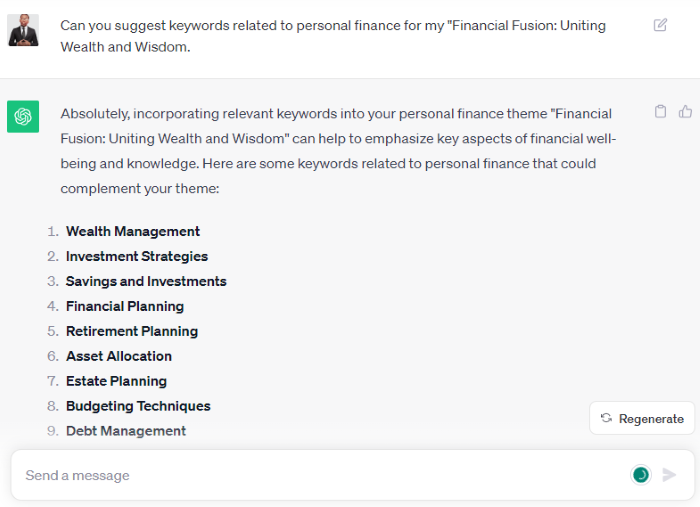
ChatGPT can provide a list of keywords and phrases as shown in the image above.
Next, you'll need to incorporate the keywords seamlessly into your course content.
Incorporating Keywords Seamlessly into Your Course Content
Once you have your list of keywords, ChatGPT can assist in integrating them naturally into your content.
For example, if your module is about "Smart Budgeting," you can ask ChatGPT this:
"Help me write about effective budgeting techniques, including the keyword 'money-saving tips.'"

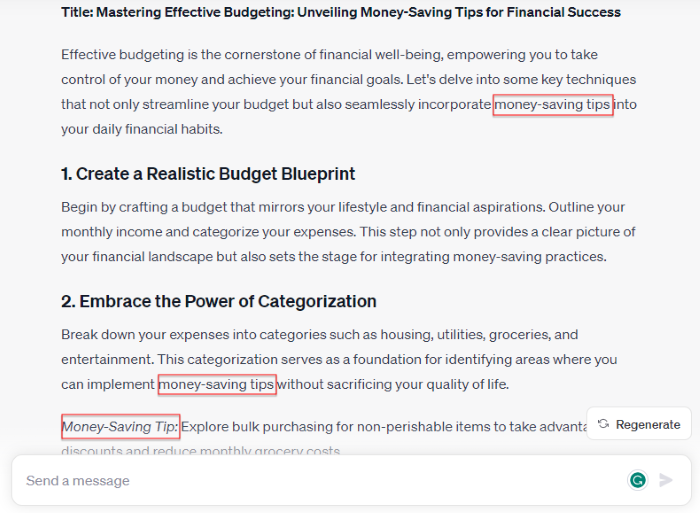
Create Engaging Quizzes for Your Course
Fun quizzes are super important in online courses because they check if students get what you're teaching and help them remember.
ChatGPT can be a big help in making these quizzes interesting. It can come up with questions that not only test what students have learned but also make the quiz enjoyable.
Let's see how it works with this simple prompt example:
"Help me come up with fun quiz questions for a Smart Budgeting class. Set questions about saving money, making a budget, and spending wisely."
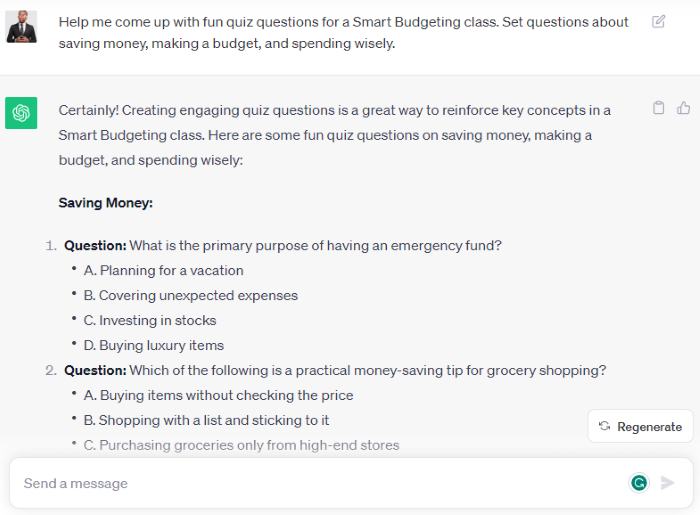
You can review the quiz questions generated by ChatGPT and make any necessary customizations.
For instance, if a question needs refinement or additional context, you can adjust it to align better with your course objectives and style.
Creating Engaging Assignments for Your Course
In addition to quizzes, well-designed assignments contribute to a comprehensive learning experience, and ChatGPT can provide inspiration and ideas for assignments that promote critical thinking and practical application of the course material.
Here is an example of a prompt you can use:
"Suggest engaging assignment ideas for my Smart Budgeting course. I want assignments that test what students know about money and also help them use that knowledge in real-life budgeting situations. The goal is to make the assignments interesting and practical for a better learning experience."
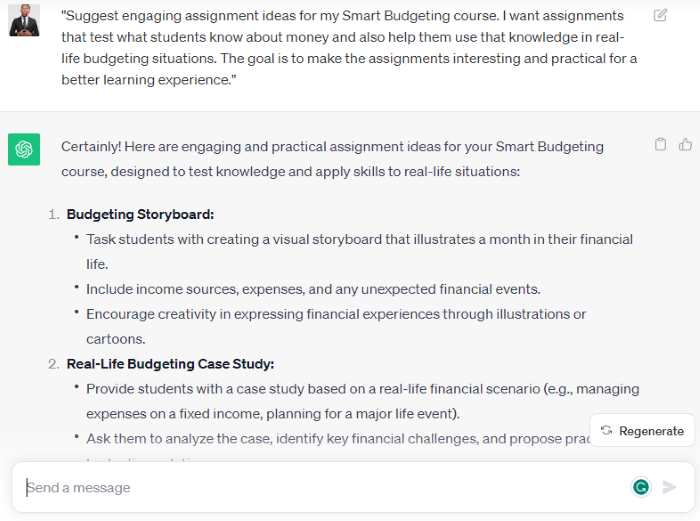
How ChatGPT Can Help You Answer Student Questions
Once your course is up and running, students might have questions that aren't covered in the original plan or need more explanation on a segment of the course content.
That's where ChatGPT comes in, almost like a helpful friend. It can assist by answering common questions and making sure students get the info they need.
But here's the cool part – it's not just for the basics. If students have more specific or tricky questions, ChatGPT is still there to lend a hand.
This means students get quick answers, making learning easier and more enjoyable. It's a win-win – you spend less time on repetitive questions, and students get the help they need faster.
This process requires you to know how to integrate ChatGPT with your online course, but the good news is that using an online course hosting platform like OnlineCourseHost.com that is already integrated with ChatGPT, can help answer the questions for your students
There is a "Help me answer this question" AI wand that can help you answer your students' questions easily. See the image below:
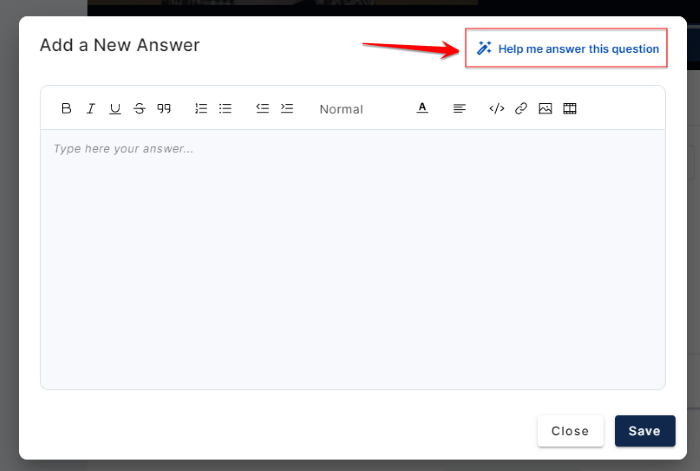
How ChatGPT Can Assist with Creating Compelling Marketing Copy Including Email
ChatGPT can help you create attractive course ads by generating ideas, suggesting engaging phrases, and adjusting the tone to connect with potential students. This collaboration ensures your ads stand out, encouraging students to act!
Imagine you want an eye-catching headline and Ad content for your course in personal finance. You can ask ChatGPT this:
"Could you provide me with some creative and persuasive Ad content with a headline to showcase the value of a finance course for beginners looking to manage their personal finances?"
It might respond with captivating titles and Ad content that draw potential learners in.


To further personalize the Ad, you can ask ChatGPT to adjust your copy to suit each platform. For instance, you might ask,
"Can you help me adapt this Ad for Facebook?"

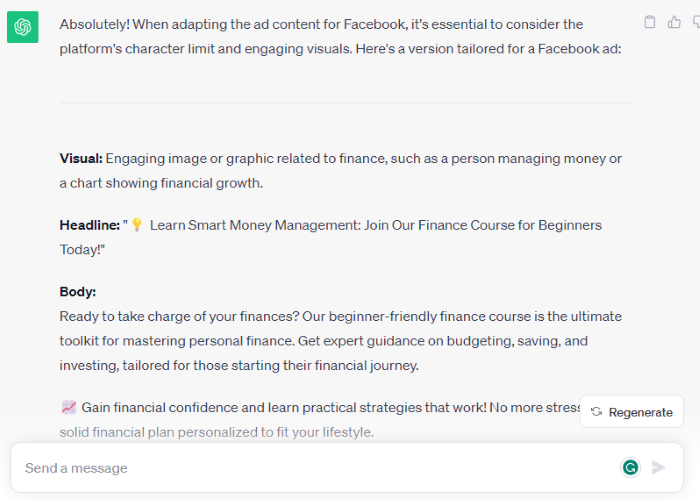
To make sure your message speaks to your target audience, you can ask a question like this:
"How can I make my ad copy more appealing to young professionals?"
And, ChatGPT will provide language and messaging that resonates with this group.
By working with ChatGPT using these prompts, you can create marketing content that effectively attracts potential students to your online course.
It simplifies the process and ensures that your marketing materials are engaging and convincing.
With an AI-integrated platform like OnlineCourseHost.com, you can improve your email copy. You can ask the AI to rewrite and improve your email copy.
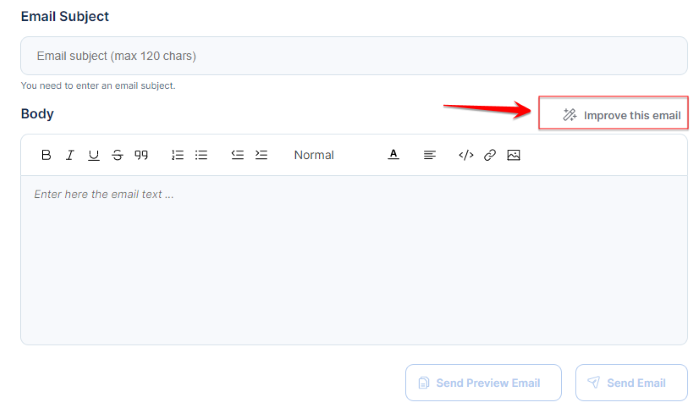
Translating Your Course Content With ChatGPT
Expanding your course globally involves translating it into multiple languages to ensure accessibility for everyone, regardless of their location.
ChatGPT is instrumental in this process, ensuring that translated content is culturally respectful, clear, and accurate.
It's like having a supportive friend who ensures everything is appropriate and easy to understand. ChatGPT goes beyond mere translation, optimizing the course to be effective for a worldwide audience.
Here is a prompt example:
"Translate my course into French. Make sure it keeps the main ideas, is culturally clear, and uses accurate terms. The goal is to make it easy for French speakers to understand."
OnlineCourseHost.com can make this process incredibly simple. If you've already built your course with it, then the integrated AI understands your content.
This integration streamlines the translation, ensuring a smooth and efficient experience. With this, translation isn't just about converting words; it's about making your course accessible and effective for a global audience.
Here is an example:
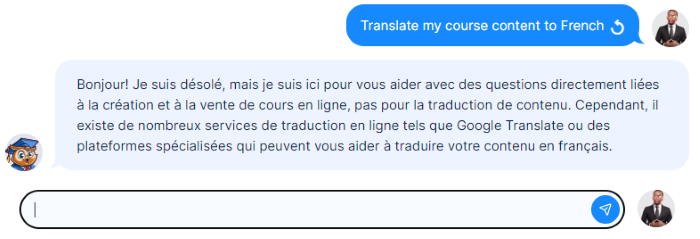
Proofreading and Checking Grammatical Consistency
Before launching your course, it's important to ensure that the content is error-free and grammatically consistent.
ChatGPT can help you proofread, check your grammar, and ensure there is consistency in your material, providing a fresh perspective and helping you polish your content to perfection.
It's not just about getting rid of mistakes. It also helps your course look nicer and more pro. This way, your students can learn better and have more fun doing it!
Here's a prompt for ChatGPT that you can use:
"Help me get my course ready for launch! I need you to proofread, check grammar, and make sure everything flows well. Also, give me tips on making it look more professional and engaging for my students. Let's make sure there are no errors and that the content is top-notch for a great learning experience!"
Conclusion
So now you know how to create an online course with ChatGPT, or at least you know how to use it to help you create your course in a much more efficient way.
Remember, while ChatGPT may not single-handedly build your course, it serves as a valuable companion, assisting you in different ways.
Its capabilities extend to generating course titles, structuring content, simplifying complex concepts, brainstorming ideas, automating responses, and even crafting persuasive marketing copy.
These capabilities streamline your course creation process, saving you time and effort while ensuring the quality and effectiveness of your materials.
As I mentioned earlier at the beginning of this post, for you to use ChatGPT you need to be good at prompting.
But here's the great news: If you are not good at prompting or want to save a ton of time, use an alternative - an online course hosting platform like OnlineCourseHost.com, with a user-friendly AI that can simplify the process even further by doing most of the prompting for you and get you much better AI suggestions:
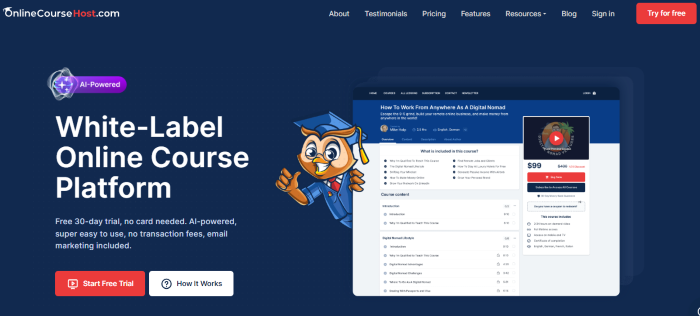
Actually, most of the tasks explained in this guide can be made using the platform.
This includes but is not limited to: title suggestions, course content ideas, generate video scripts and lesson outlines, and much more.
It makes your job of creating online courses easier, efficient, and effective.
Whether you need help organizing your content, answering student questions, or creating convincing ads, OnlineCourseHost.com can make your course creation journey much easier and more successful.
I hope you enjoyed this post. To get notified when new content is available here at the Academy, you can subscribe here to our weekly newsletter:
If you are looking to ask any questions on online course creation, you can reach me here on my Facebook group:
Join the Course Creator Academy Facebook Group
Ready to learn how to launch your first coaching program or course on OnlineCourseHost.com? Here are the helpful guides for you to check out:
- Best Online Course Platforms (Ultimate Guide)
- How To Choose An Online Course Topic That Sells
- How To Record And Edit Your First Online Course
- Affordable Online Course Equipment - Complete Practical Guide
- How To Hire An Online Course Team
- The Ultimate Online Course Launch Checklist
- How To Create The Perfect Online Course Sales Page
- Create A Powerful Brand For Your Online Courses (In 5 Steps)
- How To Sell Online Courses? The Ultimate Guide
- How To Promote Your Online Course - Complete Guide
I hope you found this post helpful, let me know in the comments below what other topics you would like me to cover or any questions that you have.
Thanks for reading… and enjoy the course creation process! 😉
Course Creators Academy, a community by OnlineCourseHost.com
Founded by Vasco Cavalheiro
Online Course Creator








 Start Here
Start Here Course Creation Journey Step by Step
Course Creation Journey Step by Step  Course Creation Software Reviews
Course Creation Software Reviews Online Course Marketing
Online Course Marketing Course Creation Tips & Tricks
Course Creation Tips & Tricks Course Equipment
Course Equipment Online Course Marketplaces
Online Course Marketplaces Revenue Reports
Revenue Reports Best Practices
Best Practices Frequently Asked Questions
Frequently Asked Questions Platform Reviews
Platform Reviews